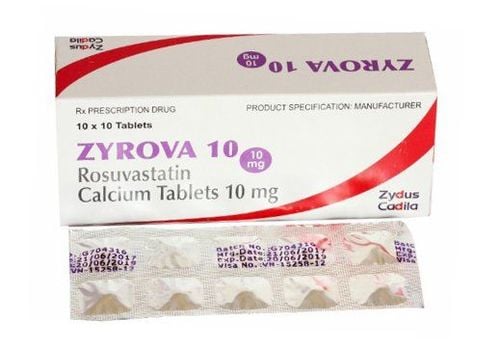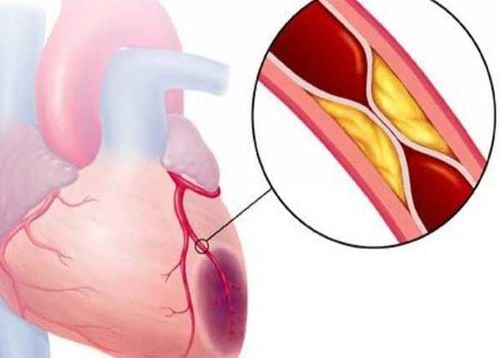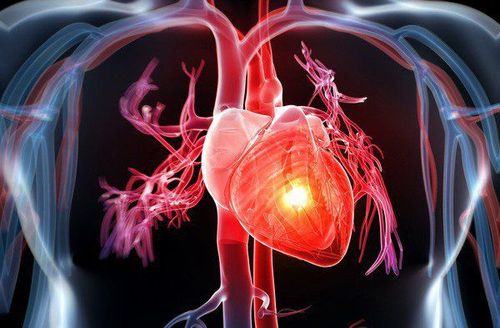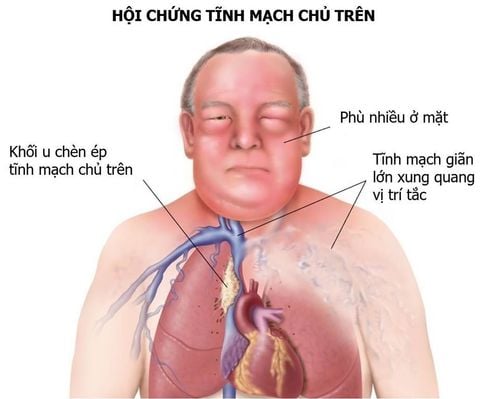This is an automatically translated article.
The article is professionally consulted by Cardiology & Thoracic Surgery doctors - Cardiovascular Center - Vinmec Central Park International General Hospital.Coronary bypass surgery allows blood from the aorta to pass through the narrowing in the lumen to continue circulating the coronary area after the stenosis to supply enough blood to the heart muscle. However, doctors need to weigh the benefits and risks before deciding to perform coronary bypass surgery for the patient.
1. Coronary bypass surgery in the treatment of coronary artery disease
Coronary artery disease is mainly caused by atherosclerotic plaques on the walls of blood vessels, leading to narrowing of the lumen and impeding blood flow to the heart muscle cells. When the blood vessels are severely narrowed, the blood flow to the heart muscle is greatly reduced, leading to a relatively large amount of oxygen deprivation to the heart muscle, resulting in typical symptoms such as angina pectoris, pain behind the sternum. , the patient feels like the heart is constricted, or the chest pain is severe. Angina pain can radiate to the back, to the shoulder, jaw, and neck, and the patient sometimes feels suffocated. More severe, the disease can lead to complications of myocardial infarction and cardiac arrest, the risk of sudden death.
Coronary bypass surgery is the most effective method in the treatment of severe coronary artery stenosis, greatly improving blood flow to the heart muscle and ending chest pain symptoms. The doctor will use a graft made of a vein or artery as a "bridge" to the back of the narrowed coronary artery. The doctor may use the saphenous vein in the leg, the radial artery from the forearm, or the internal mammary artery inside the chest wall to make the graft.
On the other hand, the patient does not need to worry about losing a part of the blood vessel that the doctor uses to make a graft in coronary artery bypass surgery, because the vascular system in the legs and arms is very rich. Even though they lose a part of the circuit, they can still fully respond to the body's activities.
After coronary bypass surgery, the heart muscle cells will be fully perfused and the symptoms of chest pain and heaviness will quickly disappear, the patient will feel much more comfortable.
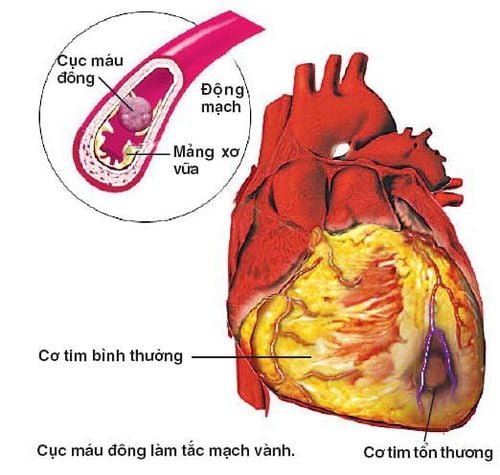
Bệnh mạch vành dẫn tới thiếu máu cơ tim
2. Advantages of coronary bypass surgery
Coronary artery bypass surgery is the most radical treatment for coronary artery disease, especially in cases where many coronary arteries are narrowed at the same time or there is a narrowing of one branch in many places. This is also the recommended measure when the patient has a history of diabetes, a long survival time, other defects in need of repair in the heart and especially the risk that surgery may occur. acceptable.
In terms of benefits, coronary bypass surgery can:
Stop angina attacks, feeling short of breath and heaviness in the chest. Reduce the risk of heart attack complications. Improve the patient's quality of life. Helps prolong life with a healthier heart. Coronary artery bypass surgery can quickly cure symptoms of coronary artery disease, including the disappearance of angina, and can last up to 10 to 15 years from the time of surgery. doing surgery. In the case of recurrent embolism after percutaneous coronary stenting, the patient may need to have surgery again. If coronary artery disease is more severe, for example multiple arteries are blocked at the same time and the left ventricle is already weakened, coronary bypass surgery has the potential to prolong the patient's life.
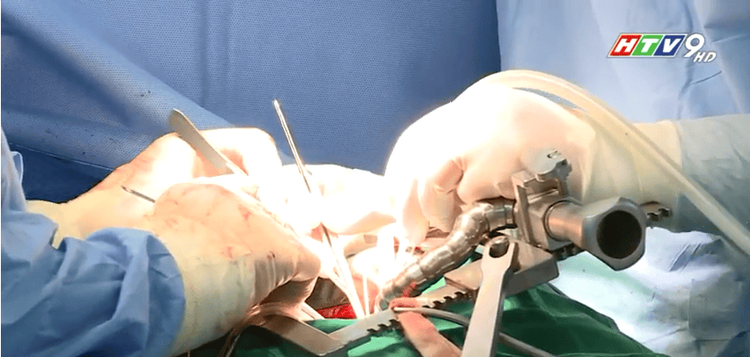
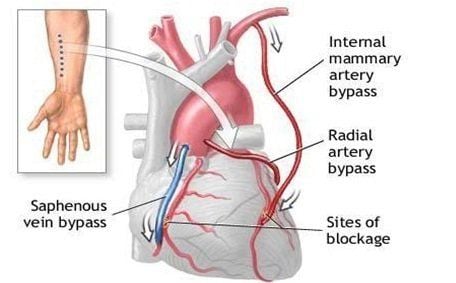
Phẫu thuật bắc cầu động mạch chủ giúp tái lưu thông máu đến vùng tim bị tổn thương
3. Complications of coronary bypass surgery
Coronary artery bypass surgery is a major surgery, and it often takes weeks or even months for patients to fully recover from surgery. Over a period of several weeks, patients often present with poor appetite, weakness, and postoperative wound pain. Manifestations of depression appear in 1/3 of cases after surgery, if not detected and treated early, depression is likely to get worse, more difficult to treat and lead to unfortunate consequences.
Other possible complications after coronary artery bypass graft surgery include myocardial infarction during or shortly after surgery (incidence less than 5%), myocardial weakness (usually temporary) , arrhythmias (especially atrial fibrillation), pleural effusion (fluid accumulation in the space between the lungs and chest wall), infection at the incision site, and disturbances in consciousness. After vascular surgery, the patient's arms and legs may appear swollen and uncomfortable. However, these symptoms will quickly improve on their own in a short time.
Because surgery carries such a high risk of serious complications, it is usually reserved for patients with significant potential to prolong survival after surgery, or who have symptoms of angina prolonged cannot be relieved by other methods.
4. Cost of coronary bypass surgery
Depending on the medical facility, the cost of coronary artery bypass surgery will be different. Normally, the cost of coronary artery bypass surgery depends on the condition of the facilities, the technique used in the treatment, the professional qualifications of the doctor and surgeon performing the surgery and a number of other factors. However, patients need to choose to have it done at a reputable facility with cardiology expertise to ensure safety, limit complications, and bring high efficiency.
5. Advantages of coronary artery bypass surgery at Vinmec
According to general statistics worldwide, up to 95% of coronary artery bypass surgery is relatively safe. Recently, according to statistics at Vinmec Central Park Hospital, 85% of coronary bypass surgery patients performed heart beat technique without using an artificial heart-lung machine. Up to now, all surgeries have been performed successfully, with 100% of patients alive and discharged after surgery with no sequelae or negligible postoperative complications and were treated stably. determined.
Patients with coronary artery bypass grafting at Vinmec Central Park received pain relief by using anesthesia for the spinal erector plane (ESP) instead of morphine, helping to reduce hospital stay and speed up recovery after surgery. Most patients are unaffected by the ICU unless too many stents have been placed before or the disease has not progressed to too severe.
Vinmec Central Park International General Hospital is equipped with today's most advanced machinery, equipment and techniques such as: Advanced hemodynamic monitoring EV 1000, applying painless surgery, from which shorten the hospital stay and limit the occurrence of unwanted complications.
Vinmec Central Park provides coronary artery bypass surgery for patients with high-tech facilities, the quality of treatment is equivalent to that of advanced countries in the world. experienced circuit, has been trained with leading experts in the region as well as in the world and is certified to be qualified to perform coronary artery bypass surgery, including:
Dr. CKI Nguyen Duc Vien Master, Doctor Do Nguyen Thuy Doan Trang Master, Doctor Ho Thi Xuan Nga Doctor, Doctor Tran Van Hung Master, Doctor Nguyen Duc Hien Master, Doctor Huynh Khiem Huy Doctor Nguyen Hong Vinh
Doctor Nguyen Luong Tan was trained in adult heart surgery and coronary surgery in France, completed his doctoral thesis on coronary surgery in Rennes - France, two years as a PhD student at Rennes - France. Australia. Before becoming Head of Cardiology Department at Vinmec International Hospital since October 2016, Dr. Tan was Deputy Head of Thoracic Cardiology Department and Head of Pediatric Cardiology Department at Hue Central Hospital.
Especially, from July 2019, Vinmec Central Park International General Hospital (HCMC) put into operation the Package Cardiovascular Treatment Program with absolutely outstanding quality, the most modern service, is Optimal choice for patients with cardiovascular disease.
This program is applied with the following 4 techniques:
Percutaneous aortic valve replacement (TAVI intervention); Placement of coronary interventional stents; Aortic bypass surgery; Ventricular septal surgery; The package treatment model is one of the activities to realize the policy of "Patient is the center" at Vinmec International General Hospital. The model of cardiovascular treatment package at Vinmec Central Park will bring the following preeminent benefits:
Multi-specialty treatment: Patients will have a comprehensive and thorough treatment plan by a multi-specialty team. , coordination from many fields; The treatment regimen is standardized according to the standards of prestigious cardiovascular associations in the world; Patients have direct access to the most appropriate and optimal regimen, avoiding the need to test many different treatment methods that are costly or reduce the effectiveness of treatment; Increase recovery, reduce hospital stay; Peace of mind about the treatment plan and proactive about treatment costs;
Please dial HOTLINE for more information or register for an appointment HERE. Download MyVinmec app to make appointments faster and to manage your bookings easily.





